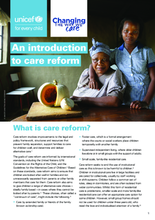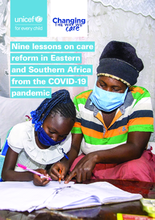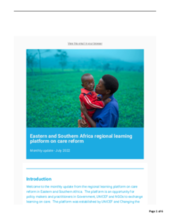This country page features an interactive, icon-based data dashboard providing a national-level overview of the status of children’s care and care reform efforts (a “Country Care Snapshot”), along with a list of resources and organizations in the country.
demographic_data
childrens_living_arrangement
children_living_without_bio
social_work_force
key_stakeholders
Key Stakeholders
Add New DataOther Relevant Reforms
Add New Datadrivers_of_institutionalisation
Drivers of Institutionaliziation
Add New Datakey_research_and_information
Key Data Sources
Add New DataThe Children Act (Uganda)
Country Care Review: Uganda
Prevalence and number of children living in institutional care: global, regional, and country estimates
The National Integrated Early Childhood Development Policy Action Plan (2016-2021) of Uganda
Catholic Care for Children in Uganda: A Family for Every Child - Findings from a Midterm Evaluation
Acknowledgements
Data for this country care snapshot was contributed by a consultant with the Data for Impact (D4I) Project at Palladium Group LLC.
Displaying 51 - 60 of 418
Although care reform is well established in some parts of the Eastern and Southern Africa, many countries in the region are just beginning their care reform journey. This short paper is aimed at these contexts. It explains what care reform is, the different components of care reform, why care reform is important and how to start a care reform process.
Key lessons learnt on how to carry out effective care reform in Eastern and Southern Africa from the COVID 19 pandemic.
This webinar hosted by the ESARO Regional Learning Platform, provides nine lessons learned on care reform from the COVID-19 pandemic with examples from Malawi, Uganda and Kenya.
This webinar provides nine lessons learnt on care reform from the COVID-19 pandemic with examples from Malawi, Uganda and Kenya.
The Eastern and Southern Africa Regional Learning Platform hosted a webinar on June 22, 2022, featuring speakers from UNICEF's head office and the Better Care Network who provided detailed examples on the importance of data in Uganda's care reform processes. This purpose of this webinar was to examine the importance of using data to inform care reform, and how data can be collected and used effectively.
The webinar, hosted by Transform Alliance Africa, provides an overview of the progress and findings from our youth wellbeing project. The youth wellbeing project is a community mental health initiative led by care experienced youth that aims to develop a safe transition pathway for young people leaving orphanages and provide support to young people experiencing well being and mental health challenges in the community.
During this webinar, organized by Transform Alliance Africa (TAA), they will talk about how they have developed the innovation in Uganda which is focusing on four key areas: Trauma and Stress, Depression and Suicidal Thoughts and Feelings, Anxiety, and Loss and Grief.
This is a recording of the first session in a webinar series celebrating the launch of of a themed issue of Global Childhood Studies journal (Volume.2; Issue.1). This first webinar focuses on Responding to varied experiences of childhood separation.
This is the monthly update of the Eastern and Southern Africa Regional Learning Platform published in June 2022.
This webinar presents the findings from the stage one analysis of the legal, policy and procedural frameworks of orphanage trafficking in Cambodia, Uganda, and Nepal. It also featured presentations on the situation of orphanage trafficking from in-country investigators and experts.



